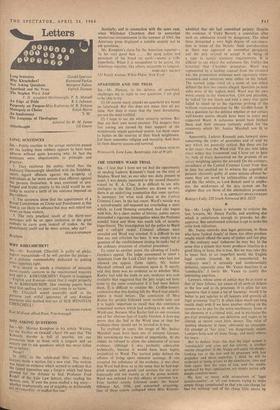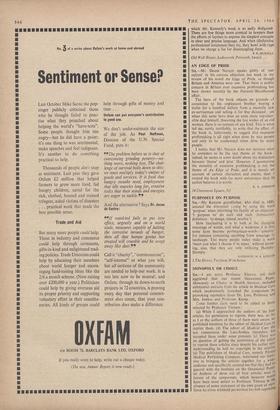SIR,—Mr. Leigh Vance is welcome to criticise the law, lawyers,
Mr. Henry Fairlie, and anything else which is unfortunate enough to provoke his dis- approval. But uninformed criticism is apt to make the critic look ridiculous.
Mr. Vance remarks that legal processes, to those who have 'looked deeply' at them, too often produce results which offend the sense of justice and fair play of 'the ordinary man' (whoever he may be). In the sense that a system that never produces injustice is a good thing to have, this is true. But we may take this to mean that, in an imperfect world, the English legal system (created, be it remembered, by 'ordinary men') is seriously and fundamentally defectiVe, especially since Mr. Vance describes it as 'ramshackle.' I invite Mr. Vance to justify this interesting assertion.
Lawyers, whose sense of justice may be as acute as that of their fellows, are aware of all sorts of defects in the law and in its processes. It is often far too expensive (but it takes a lot of learning: would it be better to pay salaries to all lawyers and provide all legal processes 'free'?). It often takes much too long (easily dealt with if we have another shilling on the income-tax to pay for the extra machinery). Some of the elements in a criminal trial, and in particular the pre-trial investigation, are defective and ought to be altered, as recent cases have shown. The rules of `putting character in issue,' obviously an unsuccess- ful attempt at 'fair ,play,' are dangerously unjust. Lawyers have said all these things. and many others, for years. But to deduce from this that the legal system is 'ramshackle' and cries out for reform, is another matter altogether. If Mr. Vance will apply his deeply- looking eye at the law and its processes with less prejudice and more expertise, I think he will be surprised at being driven to the conclusion, time and time again, that the rules of law, and the results produced by their application, are simple justice and simple common-sense. We hear so many wild accusations of 'Ittgal mumbo-jumbo': of 'all you lawyers trying to make simple things complicated so that you can charge fat fees for nothing' and of the cheap little sneers by which Mr. Kennedy's book is so sadly disfigured. There are few things more comical to lawyers than the efforts of laymen to express the simplest concepts in clear and precise language. And when (disdaining professional assistance) they try, they howl with rage when we charge a fee for disentangling them,
P. R. MURSELL
Old Well House, Lodsworth, Petworth, Sussex







































 Previous page
Previous page